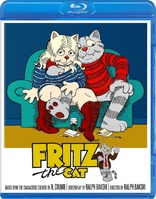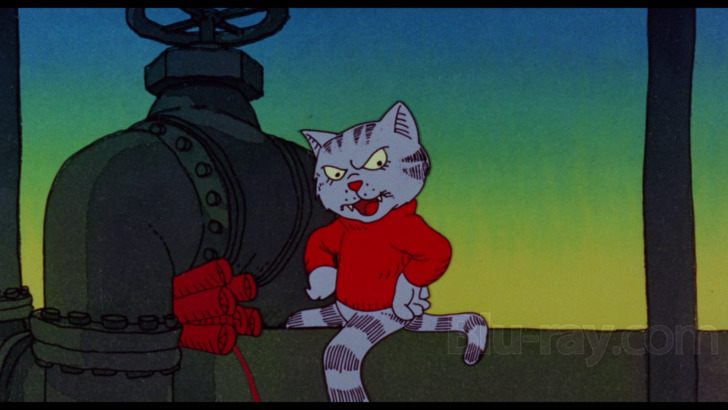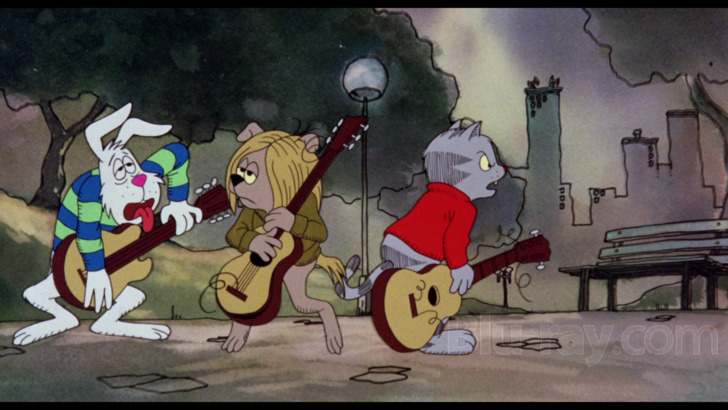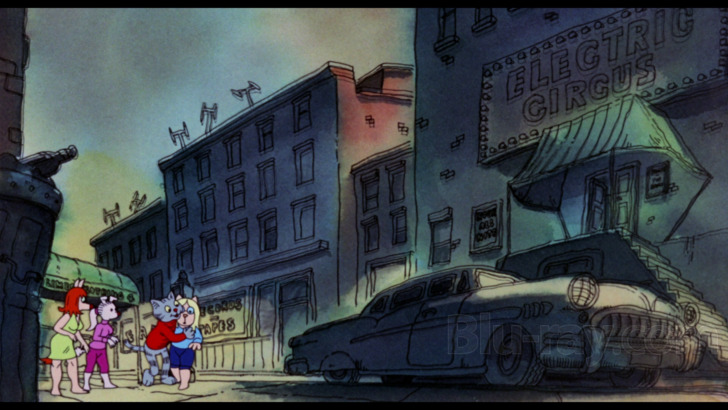Fritz the Cat Blu-ray Movie
HomeFritz the Cat Blu-ray Movie 
Scorpion Releasing | 1972 | 78 min | Unrated | Oct 26, 2021
Movie rating
6.7 | / 10 |
Blu-ray rating
| Users | 0.0 | |
| Reviewer | 3.5 | |
| Overall | 3.5 |
Overview
Fritz the Cat (1972)
FRITZ THE CAT is an exceptionally imaginative, X-rated animated feature film, loosely based on R. Crumb's underground comic character. It's a world where black people are crows, cops are pigs, rabbis are lions, and cats--like New York University student Fritz are substituted for guilt-ridden white guys who want to be poets but mainly smoke pot and engage in group sex. After a drug bust by a couple of bumbling pigs makes him an outlaw, Fritz sets fire to his NYU dorm and hits the road in search of self-discovery. The crazy cat steals a car, starts a race riot in Harlem, and ends up stuck outside San Francisco with a group of sadistic revolutionaries led by a junkie biker rabbit. Throughout these adventures, Fritz's pot-addled self-righteousness gradually gives way to a deeper understanding of life, but perhaps too late to extract himself from a terrorist plot.
Starring: Rosetta LeNoire, John McCurry, Skip HinnantDirector: Ralph Bakshi
| Animation | 100% |
| Dark humor | 7% |
| Comic book | Insignificant |
| Comedy | Insignificant |
Specifications
Video
Video codec: MPEG-4 AVC
Video resolution: 1080p
Aspect ratio: 1.85:1
Original aspect ratio: 1.85:1
Audio
English: DTS-HD Master Audio 2.0 (48kHz, 24-bit)
Subtitles
English SDH
Discs
Blu-ray Disc
Single disc (1 BD)
Playback
Region A (locked)
Review
Rating summary
| Movie | 3.0 | |
| Video | 4.0 | |
| Audio | 4.0 | |
| Extras | 3.0 | |
| Overall | 3.5 |
Fritz the Cat Blu-ray Movie Review
Reviewed by Brian Orndorf November 2, 2021“Fritz the Cat” was originally created by Robert Crumb in 1965, serving as a way for the artist to release some creative wiggles with decidedly raunchy work that couldn’t find a place in the mainstream. For the 1972 film adaptation, Crumb’s vision finds a proper guardian in director Ralph Bakshi, another artist interested in challenging audiences, using Crumb’s universe to launch what would become an interestingly unwieldy directorial career. With “Fritz the Cat,” Bakshi searches for a way to bring adult activities to animation, looking to shake the kiddie reputation of the medium with an X- rated adventure around New York City, following the eponymous feline as he indulges his obsessions with sex, drugs, and troublemaking during the counterculture years of the 1960s.

While Crumb was ultimately unhappy with “Fritz the Cat,” Bakshi tries to retain as much flavor from the artist’s imagination, including his fixation on bulbous, pointy female bodies. Ultimately, the feature is Bakshi’s beast, which he tries to tame during the run time, basically launching an episodic story of Fritz and the complications of his life. Without a strong narrative, “Fritz the Cat” plays a little too loose at times, but the idea here is to challenge audiences with imagery of anthropomorphized characters indulging vices, including an introductory sequence where Fritz gets high on hash and enjoys group sex inside a bathtub. Disney certainly wasn’t doing that at the time, encouraging Bakshi to use the creative opportunity to push the picture’s content, mixing shock value with an assessment of racial relationships, liberal guilt, Judaism, and, rather unexpectedly, domestic terrorism.
Bakshi doesn’t have much of a budget for “Fritz the Cat,” but the picture is highly designed and fascinatingly executed at times, with the production attempting to find a special free-flowing rhythm to the journey as Fritz dodges cops, befriends black people in Harlem, and deals with Nazi bikers. Vocal performances are more conversational to sell the mood, keeping the movie casual despite examining some charged situations, including extreme violence. All this strange energy is perhaps best consumed in altered state of mind, as the clear-headed experience of watching “Fritz the Cat” is difficult, especially when Bakshi tears off on tangents, losing control of the feature as it occasionally tries to make points about culture and society, and there’s a not terribly subtle condemnation of police work, with the cops depicted as literal pigs bumbling around with pistols drawn.
Fritz the Cat Blu-ray Movie, Video Quality 

The AVC encoded image (1.85:1 aspect ratio) presentation for "Fritz the Cat" provides a clear look at the animated artistry of the feature, which was created on a low budget. The viewing experience permits study of technique and creative choices, and frame detail is open for survey, with the production adding lots of information on signage and interior decoration. Colors are appreciable, securing brighter primaries on clothing, from the deep blues of the police uniforms to Fritz's red sweater. Urban tours are also filled with satisfactory hues. Source is in decent shape with a few points of damage, and some lengthier scratches are detected.
Fritz the Cat Blu-ray Movie, Audio Quality 

The 2.0 DTS-HD MA sound mix secures the carnival-like atmosphere of "Fritz the Cat," offering decent dialogue exchanges which make use of free- flowing conversations. Music is appreciable, exploring different genres with passable instrumentation and volume.
Fritz the Cat Blu-ray Movie, Special Features and Extras 

- Commentary features artist Stephen Bissette and historian G. Michael Dobbs.
- Radio Spot (:53) is offered.
- And a Theatrical Trailer (2:07, HD) is included.
Fritz the Cat Blu-ray Movie, Overall Score and Recommendation 

"Fritz the Cat" is messy and probably hasn't aged well for some viewers. It's not a feature that works without some form of preparation, as Bakshi doesn't exactly welcome outsiders to this bizarre world of hedonism and mischief. The picture has its place in film history, with its X-ratedness and substantial box office take changing animation in the 1970s, giving Bakshi inspiration to experiment in wild ways. Perhaps that's the best way to approach the endeavor, which is certainly a curious creative offering, but not terribly compelling.
Similar titles
Similar titles you might also like

The Nine Lives of Fritz the Cat
1974

Heavy Traffic
1973

Putney Swope
1969

Wiener-Dog
2016

The Dictator
2012

Borat: Cultural Learnings of America for Make Benefit Glorious Nation of Kazakhstan
2006

Duckman: Private Dick/Family Man: Complete Series - Seasons 1 - 4
1994-1997

Frat House
Slipcover Edition | Limited to 2,000
1979

Mary and Max
2009

Art School Confidential
2006

South Park
Bigger, Longer & Uncut
1999

Black Dynamite: Season One
2011

What?
Che?
1972

Shiva Baby
2020

The Groove Tube
1974

One, Two, Three
1961

Bananas
1971

A Rainy Day in New York
2019

Support the Girls
2018

The Admirable Crichton
Limited Edition to 3000
1957